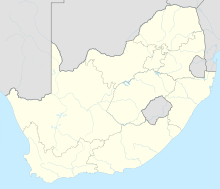TauTona Mine
This article needs to be updated. (February 2018) |
 Logo of the TauTona Mine | |
| Location | |
|---|---|
| Location | Carletonville |
| Province | Gauteng |
| Country | South Africa |
| Coordinates | 26°24′58″S 027°25′39″E / 26.41611°S 27.42750°E |
| Production | |
| Production | 209,000 (2015) |
| History | |
| Opened | 1962 |
| Closed | 2018 |
| Owner | |
| Company | AngloGold Ashanti |
| Website | AngloGold Ashanti website |
The TauTona Mine or Western Deep No.3 Shaft,[1] was a gold mine in South Africa. At approximately 3.9 kilometers (2.4 mi) deep, it was home to the world's second deepest mining operation, rivalled only by the Mponeng Gold Mine, but was closed in 2018.[2]
The mine was one of the three Western Deep Levels mines of the West Wits gold field west of Johannesburg. The mine is near the town of Carletonville. TauTona neighbours the Mponeng and Savuka mines and they share processing abilities. All three were owned by AngloGold Ashanti until Savuka was closed in 2017, TauTona in 2018 and Mponeng was purchased by Harmony Gold in 2020.[3][4]
The mine was built by the Anglo American Corporation and its 2 km (1.2 mi) deep main shaft was sunk in 1957. The name TauTona means "great lion" in the Setswana language. The mine began operation in 1962. It was one of the most efficient mines in South Africa and remained in continuous operation even during periods when the price of gold was low. Two secondary shafts were added to bring the mine to its current depth. The mine had some 800 km (500 mi) of tunnels and employs around 5,600 miners. The mine was a dangerous place to work, with an average of five miners dying in accidents each year. The mine is so deep that temperatures in the mine can rise to life-threatening levels. Air-conditioning equipment was used to cool the mine from 55 °C (131 °F) down to a more tolerable 28 °C (82 °F). The rock face temperature reaches 60 °C (140 °F).
By 2008, the mine reached 3.9 km (2.4 mi) underground. This made it the deepest mine in the world (at that time), surpassing the 3.5 km (2.2 mi) deep East Rand Mine by a considerable margin. This new shaft extended the depth from its previous 3.5 km (2.2 mi), with the intent of extending the mine's life to 2015.[5]
The lift cage that transported the workers from the surface to the bottom traveled at 16 metres per second (36 mph / 58 km/h) so together with traveling on horizontal trolleys the journey to the rock face could take up to 1 hour from the surface level.[6] The mine has been featured on the MegaStructures television program produced by the National Geographic Channel.
In the 2008 financial year, there were seven fatal accidents at AngloGold Ashanti's West Wits operations in which 14 miners died, four of those at the TauTona mine.[7]
Production
Production figures of the TauTona Mine were the following:
| Year | Production | Grade | Cost per ounce |
| 2003 [8] | 646,000 ounces | 12.09 g/t | US$ 171 |
| 2004 [8] | 568,000 ounces | 10.88 g/t | US$245 |
| 2005 [8] | 502,000 ounces | 9.62 g/t | US$256 |
| 2006 [9] | 474,000 ounces | 10.18 g/t | US$269 |
| 2007 [10] | 409,000 ounces | 9.67 g/t | US$317 |
| 2008 [10] | 314,000 ounces | 8.66 g/t | US$374 |
| 2009 [10] | 218,000 ounces | 7.29 g/t | US$559 |
| 2010 [11] | 259,000 ounces | 7.01 g/t | US$700 |
| 2011 [11] | 244,000 ounces | 7.55 g/t | US$818 |
| 2012 [12] | 189,000 ounces | 7.63 g/t | US$924 |
| 2013 [13] | 235,000 ounces | 7.34 g/t | US$920 |
| 2014 [14] | 232,000 ounces | 8.21 g/t | US$882 |
| 2015 [15] | 209,000 ounces | 8.46 g/t | US$883 |
| 2016 [16] | 146,000 ounces | 7.59 g/t | US$1,148 |
References
- ^ "Comprehensive Mining Data".
- ^ Berry, India (10 December 2021). "Top 10 deepest mines in the world". Mining Digital Magazine.
- ^ "Savuka Gold Mine". WikiMapia. 2018.
- ^ Seccombe, Allan (12 February 2020). "End of an era as AngloGold exits SA". Business Day.
- ^ "TauTona, Anglo Gold - Mining Technology". SPG Media Group PLC. 2009-01-01. Retrieved 2009-03-02.
- ^ "MINE Initiative | COMSA | Down The Mine Shaft". Archived from the original on 2014-07-26.
- ^ "AngloGold Ashanti website: South Africa country report 2008" (PDF). AngloGold Ashanti. 2008. Archived from the original (PDF) on 2009-10-07. Retrieved 2009-09-22.
- ^ a b c Annual Report 2005 Archived 2011-07-19 at the Wayback Machine AngloGold Ashanti website, accessed: 11 July 2010
- ^ Annual Report 2006 Archived 2011-07-07 at the Wayback Machine AngloGold Ashanti website, accessed: 11 July 2010
- ^ a b c Annual Report 2009 Archived 2011-09-12 at the Wayback Machine AngloGold Ashanti website, accessed: 9 May 2010
- ^ a b Annual Report 2011 AngloGold Ashanti website, accessed: 30 dec '12
- ^ Annual Report 2012 AngloGold Ashanti website, accessed: 11 nov '13
- ^ Annual Report 2013 Archived 2016-03-05 at the Wayback Machine AngloGold Ashanti website, accessed: 24 mar '16
- ^ "Annual Report 2014" (PDF).
- ^ "Annual Report 2015" (PDF).
- ^ "AngloGold Ashanti integrated report 2016" (PDF). 22 March 2017.
External links
- Tau Tona mine (ZAF-00566) Secretariat of the African, Caribbean and Pacific Group of States website

